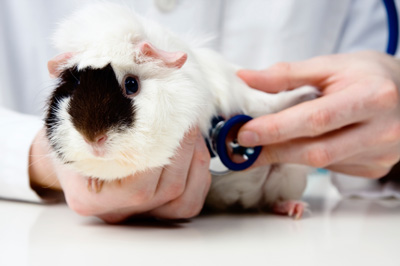Medical Concerns for Guinea Pigs
It is important to establish a relationship with a cavy savvy veterinarian. This way, if the pet becomes ill, you'll know where to go. As for any pet, an annual physical exam is recommended. Careful observation of these pets allows for the understanding of normal behaviors, which permits the rapid identification of problems. Remember that these are prey animals who will go to great lengths to hide signs of illness.

Common Guinea Pig Ailments Include:
Respiratory problems
Skin disease, including parasites and ring worm
Bladder problems, including stones and infections
Vitamin C deficiency
Ovarian cysts
Digestive problems, such as bloat, diarrhea, intestinal twisting and obstructions
Dental issues
You should call your veterinarian immediately if you see: diarrhea, drooling, an increase or decrease in appetite,or abnormal discharge from the eyes or nose.
Reproduction
If males and females are housed together, and babies are not desired, the male should be neutered. If used for breeding, female guinea pigs, also known as sows, should be bred the first time, at less than 6 months of age. First time mothers over this age may be unable to give birth naturally as their pelvis may not open allowing the babies to pass through. Baby guinea pigs are precocial. This means they are born fully furred with their eyes and ears open and functional. Though they may nurse for up to three weeks, these little ones begin nibbling on regular foods almost immediately.





